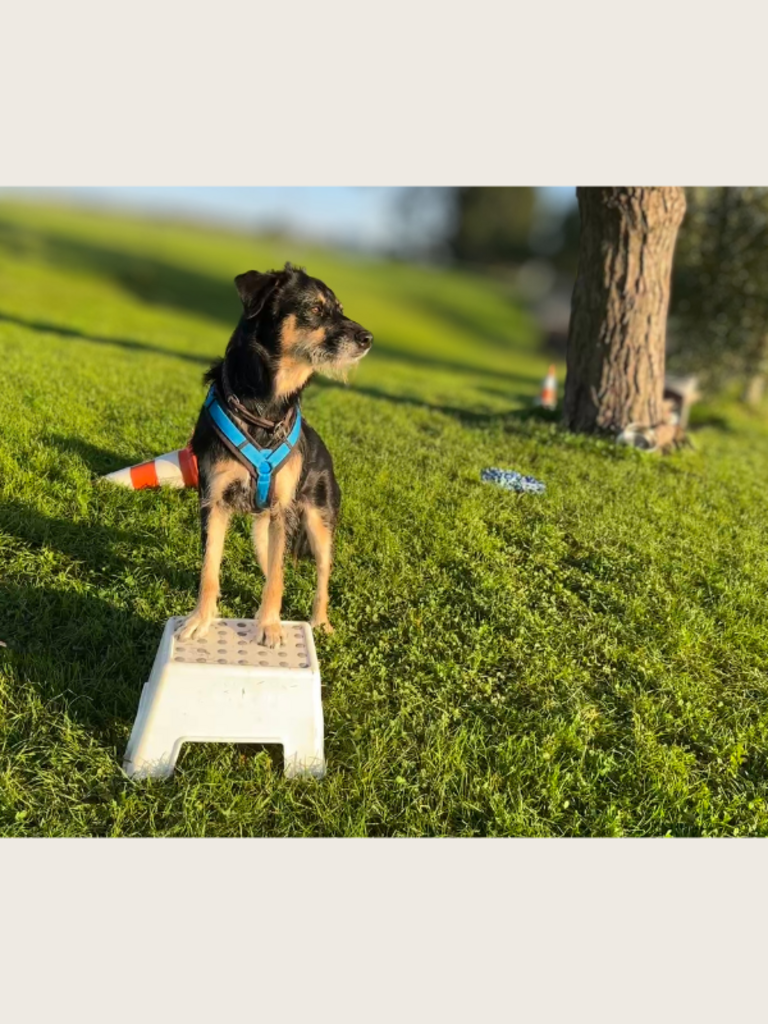Recently we (my husband and I) went to a restaurant and of course I immediately noticed that there were several young dogs (about 5 months old) of the same breed who were probably doing so-called restaurant training.
They were all lying on a blanket and were all on a harness, which as a positive trainer always makes me happy when I see this.
The dogs were spread around the room, but the distance between them was still no more than 2 - 3 metres, which is a big challenge for young dogs. In another corner of the restaurant was a table with 2 couples and 4 children. One of the children was probably tired of sitting around for so long and started running around the restaurant. The parents let this happen (which in my opinion is okay for once). Unfortunately, however, the child was a great incentive for the young dogs to move around as well and oops, that was the end of my fun. The man right next to our table immediately reacted violently when his young dog pushed himself out of his lying position and went towards the child (playfully). There was a sharp ‘NO’ and the puppy's carer stood in front of the dog and physically pushed him back onto the blanket with a fierce ‘down’. The young dog immediately pulled his ears to his head, ducked away and then lay down again. This was followed by another sharp ‘down’ and a ‘stay’. The dog stayed down, but then immediately wanted to move again to go after the child again. He was then held back by the harness with another ‘Stay’.
It was no longer possible for another puppy to counteract his impulse control and he barked at the other puppy. The lady who was sitting with him immediately said a fierce ‘no’ and the puppy's muzzle was then immediately closed.
I said to my husband - I have to get out of here - and we went straight out. Should I or could I have said something? Yes, I could have - then I would have started a big discussion with 5 puppy owners and probably the trainer or the breeder, which I really didn't feel like having during my holiday. Is it worth saying something in such situations? I think not, because the whole situation was already stressful and complex for the puppies' carertakers. What's more, they are ‘not doing anything wrong’ because they have been instructed accordingly.
Are boundaries important in a dog's life? Of course. I also want my dog to stay put in the restaurant and not run after everything or bark. I also don't want my dog running across the road, constantly hanging in the lead, chasing animals, racing after motorbikes, bicycles and tractors and trying to bite calves or wheels, etc.
Do we have to burn boundaries about physical harassment/threats, muzzle grips, leash jerks, kicks and much more into the dog's brain? Of course NOT.
In the restaurant situation, it would have been so easy to reward the puppies for their great behaviour - namely staying on the blanket. Timed training would also certainly have been valuable, because impulse control is used up - much more quickly in young dogs than in older ones. Instead of sitting in the restaurant for 30 minutes and ‘forcing’ the dogst to stay, the training could have been done for 10 minutes, rewarding the dogs frequently and well for calm behaviour and then leaving again.
When I train dogs or client-dog teams, I always first try to establish what the dogs can accept as a reward in the given situation. I also always analyse why the dog is behaving the way it is and think about what I can change in the dog's management to make it better. If a dog pulls or constantly bites the lead, there is always a reason. Very few dogs bite the lead for fun unless it is a dog that loves to fetch and the behaviour of ‘carrying the lead’ has been built up or often rewarded. Otherwise it is always a sign of excessive demands, stress, flight (out of fear) or much more (unfortunately there is no single reason here, it is extremely individual).
Our dogs so often show good and desired behaviour, which we can reward wonderfully before we let the dog run into ‘bad’ behaviour. Now many people are probably thinking ‘yes, but’ - if my dog suddenly runs after a deer, I can no longer use prevention to solve the problem. Absolutely correct - but in this case it is worth training a super strong ‘stop’ signal if the recall is not just 70% correct, but at least 98%. Setting boundaries doesn't mean just letting the dog do it, but rather that you train the dog to perform certain signals when the dog is highly excited or already stressed.
There are so many fair and nice ways to set ‘boundaries’ for your dog. In the end, it is also very individual which boundaries are important to you for your dog. For me, it is simply an absolute NO GO to use punishment, pressure and force to set boundaries. We are far too advanced in dog training to know that there are other ways to do this. Thank you to everyone who is thinking about this and rethinking their training approach with their faithful furry friend.
